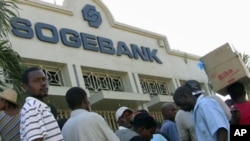Haitians crowded into banks and money transfer offices that reopened Saturday for the first time since last week's earthquake. Few Haitians have been able to work or access their bank accounts for nearly two weeks.
Haitians clutched identification cards and checks, as they waited in line in front of a building that houses a local bank branch and a Western Union office in the capital. Some people yelled and pushed aside one young man when he tried to press his way into a spot near the front of the line.
Bank employees filled out forms before clients were allowed inside the building, as a Canadian police officer with the United Nations and a Haitian officer looked on.
George Bernard came to the bank to receive a $50 transfer from family members in Florida. He says his house and most of his belongings were lost in the earthquake, and he needs the money to buy food and water.
"My family sent some money for me, I just come wait for my money," said Bernard. "If I don't find it, I'm dead, because I have no one here to give me nothing."
Bernard says prices already have started climbing for rice and other basic commodities, making it even more difficult for people struggling after the quake.
Many Haitians rely on remittances from family members in the United States and elsewhere, and many have stepped up transfers since the quake. The disaster leveled several Western Union buildings and cut off telephone communication, bringing the city's financial system to a standstill.
Edmund Themolien has yet to communicate with his family in the United States. But he came to the bank early Saturday in the hopes that his relatives sent something for him.
"My telephone not working, my family cannot call me," said Themolien. "I'm going to check maybe they sent some money for me to the Western Union. Because they have to send me money because half my family in Haiti is dead."
Frepel Desjardins held a spot for his cousin, who was expecting to get a $40 transfer from relatives in the United States. He said he has been able to survive until now only because vendors at the local market have given him food which he must pay for later.
"In the market, they give you credit," said Desjardin. "Everything is credit, credit, credit. Now the stores they want their money."
Desjardins says he does not know how he will repay his debts, since there are almost no jobs available after the earthquake. He says his main hope is that he can get a passport and try to make his way across the island to Santo Domingo, Dominican Republic.
Haitians Crowd Few Banks Reopening After Quake

Bank employees filled out forms before clients were allowed inside the building, as a Canadian police officer with the United Nations and a Haitian officer looked on.



